#tv writing
Text
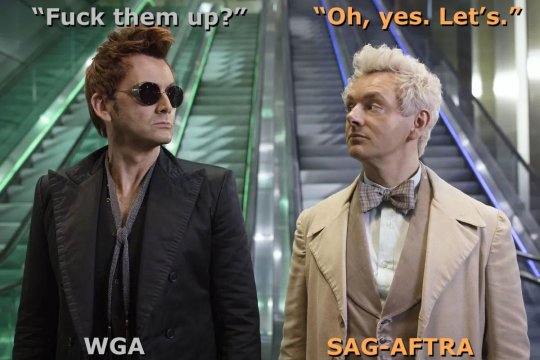
I made another thing.
With apologies to Neil Gaiman.
#tv writing#wga strong#wgawest#wga west#wga strike#support the wga#i stand with the wga#sag aftra#good omens#neil gaiman
54K notes
·
View notes
Text
A misunderstanding about the (possible) upcoming writer’s strike I’ve seen that I’d like to correct is that I’ve seen a lot of people saying it’ll make TV bad again (they always reference Heroes lol). Usually it’s in the context of, “I support the writers but not looking forward to another Heroes season 2.”
There are two big differences between this strike and the previous one:
1) The biggest, timing. The previous strike started in November, when most network shows are right smack in the middle of writing their season. This one would be starting in May, when most network shows’ writer’s rooms are on hiatus. I know for The Blacklist, we finished writing the season weeks ago. The strike won’t affect The Blacklist at all, and the same is true for basically all network shows — it might mean they’re late coming back, if the strike is still happening when it’d be time to come back from hiatus (not The Blacklist, specifically, as we’re done, but for returning network shows), but there is no sense of “Oh god wrap all this stuff we started up!!”there was in 2007.
2) The rise of streaming, which does not adhere to the usual July-April writers’ room schedule, but DOES usually write all the episodes before filming, and then film all the episodes before airing. Those rooms might get shut down in the middle of writing (and hopefully it’s just a pause that will resume when the strike is over), but it’s not like there’s part of a season already on the air they need to write a quick conclusion to.
Hope this helps! Union strong
#tv writing#WGA strike#I’ve gotten two posts about the strike to go viral#let’s go for three baybeeee
1K notes
·
View notes
Text

94 notes
·
View notes
Text
“Why is there so much exposition these days?”
1 - People learn from what came before. This can include bad lessons, and copying without actual understanding.
If exposition has been trending upwards over time, then new creators were effectively being taught to do it.
2 - Outside of novels, there is usually very finite space / time for telling a story.
Natural demonstration / showing of some information can be too inefficient, and other things might be given priority (such as cool action scenes, emotional moments, etc.).
3 - We live in an age in which feedback is instant, and any confusion from the audience is loudly passed on.
It’s natural that creators will feel pressure to get ahead of such confusion.
75 notes
·
View notes
Text
Welcome to The X-Files Script Archive
In celebration of the show’s 30th anniversary year, The X-Files Script Archive is now open! To read any one of the script drafts listed below, just fill out this simple form: https://forms.gle/4No54YU7LeYozoFk8




Please note that all scripts are strictly for educational purposes only. They are not to be copied, reproduced or sold in any form. That means NO SCREENSHOTS please. You will need a google account and to submit a valid email address associated with the account you will be reading from — other email addresses will not work. Please be patient while your request is processed and do not submit multiple forms at once. You will be granted a three-day window to read each script, or until you submit a new request if sooner.
If you are the writer or copyright holder of any of these scripts and wish to have them removed, just contact us. We humbly ask that you consider not doing so as the archive is entirely free and strictly not for profit in any form. It only exists as an educational tool and to celebrate the immense talent and hard work of the show’s outstanding writers.
103 notes
·
View notes
Text
"The painful truth is that TV isn’t about to get worse. It’s already worse—and the quality might slip even further."
You've probably seen some people saying that the 2007 writers strike led to worse TV and are worried it'll happen right now. (The idea that shows got bad in '07 is debunked here, by the way.) But what if TV is... already kind of bad, and getting worse, due to the exact problems that caused writers to strike?
edit to add, if the Atlantic is paywalled, try opening it in a new browser, in Private mode, or by using Firefox with addons Duckduckgo Privacy Basics and AdBlocker Ultimate. While we encourage paying journalists via subscriptions, we understand that it's not financially viable for everyone.
follow @fans4wga for reliable strike news, from an organization of fans working in solidarity with WGA members.
111 notes
·
View notes
Text

Over the years, due to the six shows I've been in the room for and my 19 years of entertainment industry experience, I have been a guest lecturer at NFMLA, Girls Write Now, NY Times Film School, and NYU - Tisch School of the Arts.
I'm in this group because I was a writer's PA and Writer's Assistant, but I was not promoted on the shows I was an assistant on. I optioned a pilot as an assistant and became a staff writer on a show I was completely unconnected to with the power of just my writing sample.
Over the years, many have pushed me to teach a course in order to share my unique take on "writing what you know" and writing a successful pilot script that will get you repped and staffed.
Here's the link: https://learntowritetv.teachable.com
I hope you'll check out my teachable course and I hope it will be helpful.
-N
In the course, "TV Writing For Beginners", experienced television writer Naomi G. Davis will introduce students to the fundamental principles and techniques of writing for television.
Whether you aspire to become a TV writer or simply want to explore the art of storytelling through this medium, this course will provide you with the tools and knowledge you need to get started.
From understanding the structure of a TV script to developing compelling characters and storylines, you will learn the essential skills required to craft engaging and entertaining television content from understanding story structure to crafting compelling dialogue and character arcs to elevate your TV writing skills.
#writing#writing tips#writerscommunity#TV#tv writing#Writing advice#writing resources#TV Writing tips#TV Show#The Marvelous Mrs. Maisel#The Get Down#Dash & Lily#Endgame#Splinter Cell#Endgame NBC#Writer#female writers#ao3 writer#on writing#writers#emerging writers#emerging writer#TV Writer's Room#Writer's Room
16 notes
·
View notes
Text
While they’re at it, television writers should refuse to work unless they have the certainty that the show will not be canceled out of the blue, but either a) they are given a minimum x number of seasons, no matter what, b) if the show gets canceled, they still get a number of episodes (a short extra season) to wrap up the story, c) both.
77 notes
·
View notes
Text
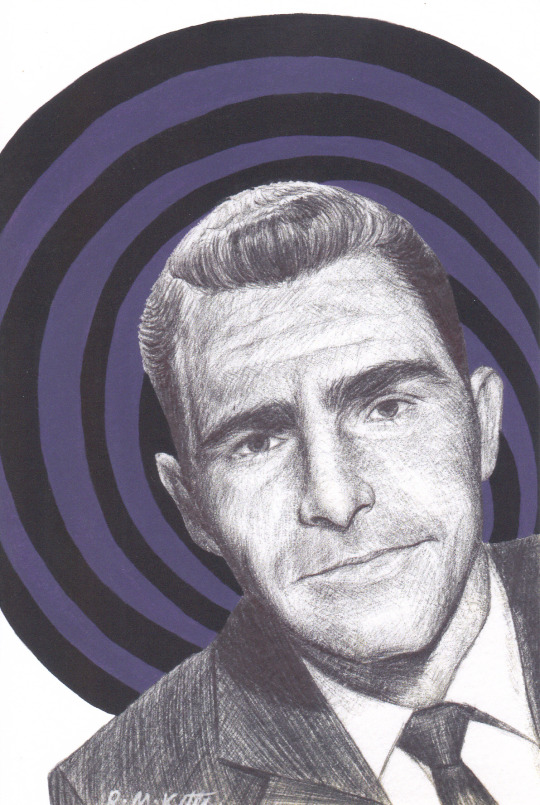
A scan of a sketch gifted to me by a good friend.
This was done by the artist Rachel Morgan Kitti. You can check out her other fantastic work at rachelmorgankitti.com or visit her Instagram.
#the twilight zone#twilight zone#rod serling#artwork#artists on tumblr#rachelmorgankitti#sketch#science fiction#television#tv#tv writing
41 notes
·
View notes
Text
I think we're in the midst of a new genre of 4th wall breaks, for lack of a better term, where the character isn't actually speaking to the audience, but the writer is.
Marvel, disney shows and remakes...it feels as though the writers are so hyper-aware of the audience, so hyper-cautious of coming across as pleasing and so crystal-clear to the viewer, that it feels disingenuous.
I don't want to watch something that feels like a training video HR told corporate to show in the boardroom -- here's how women prefer to be spoken to, here's how parents can nurture their children, here's how women can learn to be leaders. You're lonely? Here's an example of a dialogue about how to discuss your emotions with a friend -- All to be performed for you in a hastily written skit that illustrates the point only vaguely more engagingly than a basic power point would have.
Listen. my guy. People so rarely say exactly what they are thinking or feeling. Usually we layer our speech with subtext.
Think of Andor, which uses environmental story telling (set design, colour palettes, costume design, lighting) as well as camera work/editing, music, and physical performance to say so much without a word spoken.
Or Wall-E. Literally Wall-E. Very little dialogue, so much story.
And then you watch the new Thor movies and it's just...I'm so sorry to be a party pooper but it's frustrating the way we are hand-held through every emotional beat.
Good dialogue is not on-the-nose all the time.
Same with the second season of Good Omens. Season 1 was riddled with feelings not verbalized but understood, both by characters and the viewers, and season 2 bulldozed that and put it all into dialogue...which was not only pointless bc like we just did all this in season 1 (I don't care if it's a "bridging season" that's such a weird excuse), but it's the perfect example of feeling the angst along side characters vs. being told by the dialogue--the characters themselves telling us--that they are angsty. You know the writing advice "show don't tell"? yeah, this is that. "Say it" without actually saying it.
I just...I don't know how to wrap this up except to say that i'm tired of being excited to watch stuff only to be disappointed by feeling like i'm being introduced to a new Emotional Experience and they wanna make sure I've wrapped my lil noggin around it. You can hit all those same beats, explore all those themes and emotions, but write a good story. That means stop leaning on dialogue so heavily, and if you must use dialogue it can be indirect. Let Michael Sheen do all the facial acting if that's what it takes. Just stop piling every thought you have while writing into dialogue because my god it's so wooden.
Maybe this is to do with the writer's strikes that has gone on, in all fairness. I understand writers are badly paid and are under stupid deadlines, so you gotta spit out what work you can under those conditions. I do get that. But...yeah. Just had to shout this into the void before going to sleep.
#writers#writerblr#marvel#disney#starwars#good omens#writers guild strike#tv writing#andor#good omens season 2#rant
27 notes
·
View notes
Text
So, the studios never intended to negotiate in good faith. They want to crush the WGA to head off a larger labor movement. They're spooked by how we split the agencies and are freaked out by the idea of a SAG-AFRRA strike and want to degrade our morale. No surprise.
Hollywood Studios Anticipate Writers Strike Lasting Until October – Deadline
3K notes
·
View notes
Text
ok so I have a question for y’all and this is gonna sound snarky but I’m genuinely asking — what are some shows that have aired in the past 15-ish years where the two lead characters, after a long time of being friends, got together as a romantic couple and it was generally seen as a bad thing/out of character/poor writing by the majority of the show’s viewers?
bc I feel like all I ever hear is writers parroting this idea that “there’s too much romance! we’re subverting the norm by making these two leads platonic :)” and was this true at one point in time? sure! but now it feels like every show is doing this, to the point where it’s no longer subverting the norm to have your leads not end up together, it’s just,,,, the norm now to build up a perfectly good romantic relationship and then slap a platonic label on it at the last minute so as to avoid being called cliche.
#im gonna tag this as like#every ship I'm minorly invested in thats been wronged#tedbecca#bellarke#braime#caryl#tv writing
91 notes
·
View notes
Text
3.13 Ghostfacers
- Script (Production Draft) 🚨NEW🚨
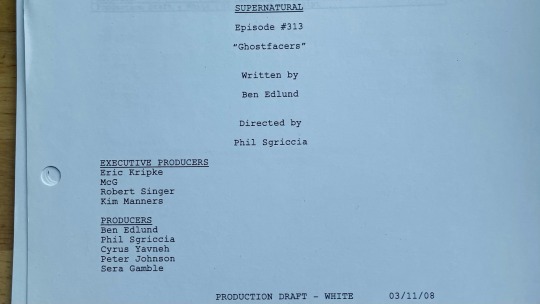
Read Now ⤵️
Our collection ⤵️
Our signed script fundraiser for World Central Kitchen (raffle closes Sat. Aug 26 @ 11:59pm Eastern) ⤵️
#admin: lets-steal-an-archive#3x13#we can only continue adding to the collection if we reach our fundraising goals#we reached it and blew past it with the trevor project fundraiser last year#we recieved almost $4k in receipts in one week for our thank you raffle#right now we are $170 until $4k#our goal is $5k#scripts#tv writing#supernatural#ben edlund
39 notes
·
View notes
Text
A lot of TV show stories feel rushed 🏃♀️
That’s because they are, and it’s by necessity.
Like, yes, that all happened quickly, but shows these days are being given 8-12 episodes with no 100% guarantee of additional seasons. They don’t have time to take their time ⏱️
I’m not saying that’s good, bad, or neutral. It’s mostly just a thing people still seem to be surprised by, and people are still giving “they should’ve given this more time” notes.
I’m sure the writers would have liked that, too! 🙃
113 notes
·
View notes
Text
The X-Files - “Home”
Written by Glen Morgan & James Wong
July 26, 1996 (BLUE)
Mulder’s original line was never going to make it past Standards & Practices...

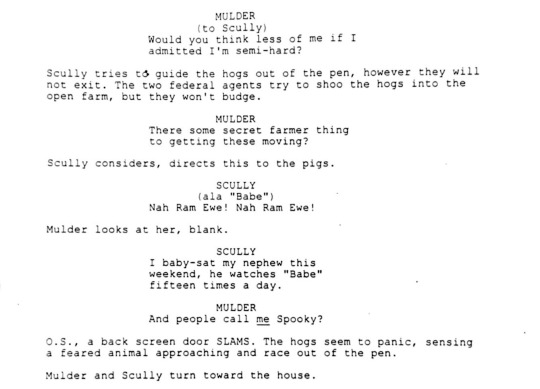
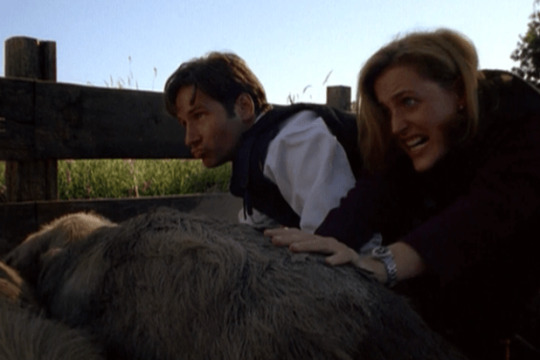
#the x files#x files#scripts#txf#s4#season 4#txf s4#txf bts#home#script#glen morgan#james wong#david duchovny#gillian anderson#mulder#scully#screenwriting#tv writing
99 notes
·
View notes
Text
Andor - S1E1 "Kassa" - Structural Analysis
This is a written analysis of the plotting and structure of Andor from a screen/TV writing perspective. I'm an aspiring screenwriter studying TV, film, and theater writing in college and this is my pet-project: to examine the way Andor constructs story in order to achieve certain dramaturgical effects. I hope to do similar analyses for the rest of the season as well. Thank you for reading!
This will contain spoilers for all of episode 1, spoilers for the first arc (E1-E3) and mild spoilers for the rest of the season.
Show premise
Petty-thief Cassian Andor is hunted by the Empire while a revolutionary movement coalesces across the galaxy.
Ferrix Arc (S1E1-S1E3)
Stories (Arc-wide)
A-story: When a pursuit for information regarding the whereabouts of his long-lost sister leads to him being a wanted man, petty-thief Cassian Andor is forced to do anything he can to remove himself from the attentions of corporate security, but the ensuing confrontation leads to death and destruction within his community.
B-story: (in flashback) When a mysterious starship de-orbits over Kenari, young Kassa embarks on a quest to prove himself as a capable member of his community, but the confrontation results in the destruction of his community and his abduction by off-world scavengers, never to see his family or his sister again.
C-story: Deputy inspector Syril Karn seeks to prove himself as a capable officer and a force for justice by apprehending the killer, but does so by disregarding his orders and endangering the lives of his comrades.
D-story: When Timm gets jealous of Cassian’s reentry into Bix’s life, the relationship is strained by mutual secrecy and miscommunication, leading to Timm’s death at the hands of a corporate cop.
S1E1 - “Kassa”
dir. Toby Haynes, wri. Tony Gilroy
streamed September 21st, 2022
Stories
A-story: Petty-thief Cassian Andor seeks to lay low and cover his tracks after a fatal shake-down with two corrupt cops leaves him a wanted man, but finds that his community distrusts him after overdrawing one too many favors.
This A-story is very central to the entire episode and with the exception of the B-story, all other stories causally spring from this story and end up relating to it in some way by the end of the arc.
B-story: In flashbacks, young Kassa wants to prove his worth by embarking on a scouting mission with the other “adults”, but abandons his sister in doing so.
The B-story serves both in the arc and the episode as a way to provide an elegate symmetrical structure. There’s a scene in the beginning of the primary action of Cassian’s pursuit after the opening sequence, one in the middle, and one in the very end. At the same time, the flashback serves to articulate some of the internal dysfunctions of the character, even though it takes a few episodes for it to fully manifest.
C-story: Security deputy Syril Karn wants to solve the murder of the two cops to fulfill his vision of justice, but finds that nobody in his organization, especially his boss, wants to help with his pursuit of the killer.
Here, Tony starts to flex his muscles in devising institutional drama and plotting. The main antagonistic force in the story does not operate unimpeded; he instead is faced with his own antagonism that articulates two key themes: 1) the empire stifles the freedom of those that serve it, and 2) fascist societies generate fanaticism regardless of whether or not it advances their cause or helps to maintain the preferred status quo.
D-story: Cassian’s reentry into Bix’s life prompts friction and secrecy between Bix and her romantic/business partner, Timm.
This almost functions as an addendum to the A-story, but gets its own special attention in how it chooses to articulate the Bix/Timm relationship. But it comes to have a direct causal effect on the A-story in subsequent episodes. Infact, the way causality transcends the stories becomes extremely intricate in its own right. Dramatic action becomes an emergent property of these interactions.
Scene sequences
OPENING/CLOSING IMAGES
OPENING IMAGE: Streetlights moving rapidly in the rain; Cassian in pursuit of his sister.
CLOSING IMAGE: After Kassa leaves his sister for the last time, she watches him as he runs away.
1: I./E. BROTHEL, MORLANA ONE - NIGHT (A-STORY)
Cassian enters an upscale brothel in search of his sister. When he receives special attention from the hostess, two on-duty corporate cops start antagonizing him. Cassian gets too pushy in getting information from the hostess, prompting him to get kicked out of the club and his pursuit thwarted.
2: EXT. MORLANA ONE - NIGHT (A-STORY)
Cassian tries to exit discreetly, but is held at gunpoint and shaken down by the two offended corporate cops. They attempt to rob him, but Cassian is able to outwit them, inadvertently killing one of them in the scuffle, and recovering the gun. With the tables now turned, the remaining cop tries to persuade Cassian to spare him, but Cassian kills him to make his escape.
Let’s talk about these two scenes as a sequence, because they function as one discrete unit of storytelling. Andor doesn’t do cold opens - though this sequence could very easily serve as a riveting cold open if they moved the title card to right after this scene. Being a streaming exclusive without commercial breaks, Andor also doesn’t use hard act structure with distinct act outs, even though we’ll come to see Andor as employing techniques similar to traditional TV act structure at times.
In TV writing, we sometimes encounter this idea of cold opens or opening sequences serving as story microcosms. In the sense that the structure and action of the sequence is representative, in a small way, of the way the world we see in the episode, season, and series functions. Andor’s opening sequence has him engage in a seemingly innocuous pursuit, enter a highly dangerous yet extremely familiar situation of power-tripping LEO, and leads him to make a difficult choice to escape the dangerous situation. It’s telling us that this is a world where good people have to make hard choices to survive because of the danger of the society they live in, which we will come to see in subsequent story units, is a racist, fascist, imperialistic, and capitalist society.
3: I./E. FERRIX / MAARVA’S SHIP - MORNING (A-STORY)
An extremely quick scene introducing us to Ferrix before work-hours, B2’s winning personality, and establishes the pretenses for Cassian’s flashbacks in the B-story.
This isn’t really a real scene because it doesn’t have conflict, it doesn’t have antagonism, and it doesn’t have pursuit. But it serves as a good framing device and orients us to where we are on Ferrix.
4: EXT. KENARI VILLAGE - DAY (B-STORY)
This scene introduces us to Kenari, Cassian’s sister, and Kassa (the young uncontacted version of Cassian). We don’t get much action or context in this scene, but discerning viewers are able to pick up on the fact that this is a society populated solely by children and teenagers wearing and using old industrial equipment. Something very bad clearly happened here. We also see the mysterious ship de-orbiting, and the reaction the community has tells us this isn’t something they’re used to.
The decision to completely eschew subtitles is a pretty fascinating directorial choice and one that has gotten a lot of attention online. But It does a lot to ground the movement solely on the acting and visual language, as opposed to dialogue construction - though arguably it makes the plotting of this story a bit more sparse.
5: INT. MAARVA’S SHIP - DAY (A-STORY)
We get a short scene with Cassian where he starts to formulate a plan. We also get some indication that Cassian has a community on this planet with Bee mentioning Maarva and Brasso. In some ways, Maarva’s the antagonist in this scene because she’s besmirching Cassian to the others, even though she’s not there and it’s coming from Bee.
“Spectral” antagonist: A representation of the antagonistic force in the story by a character who isn’t that main antagonistic force. Bee’s just passing on information from someone else, but in doing so, he’s softly acting as the antagonist for the moment. We see this technique employed a lot in this episode and this show, especially since shows operating in the prestige mode often go entire episodes without main oppositional characters meeting (i.e. Cass and Dedra still haven’t met).
6: EXT. RIX ROAD - DAY (A-STORY)
Cassian convinces Brasso to spin a lie for him, but in doing so, it becomes apparent that Cassian’s sleaziness has overstayed its welcome in the community.
This is when the main sense of antagonism in the episode starts to crystalize for Cassian. Maybe once, his petty crime and hustler antics were overlooked in the community, but those days are coming to an end as Cassian’s options dwindle. That’s the source of danger, more than the possibility that he’ll be caught for the time being.
7: INT. PRE-MOR SECURITY CHIEF’S OFFICE - DAY (C-STORY)
Syril delivers the report of the double-homicide to Chief Hyne - keen on making a good impression and presenting himself as a dutiful officer, but Hyne sees through the bullshit and orders him not to investigate the murder in an effort to sanitize Pre-Mor’s crime reports under Imperial jurisdiction, leading Syril to be incredulous.
This is a great scene. It works wonderfully schematically, the scripting is stellar, and the acting is spot-on. This is the scene where I was truly convinced of what Andor’s storytelling was capable of. Syril comes in with a pursuit (deliver a report) with a deeper motivation (pursuit of justice) which is fueled by dysfunction (he is deeply insecure about his position as an officer and is desperate to please). The pursuit is met with opposition (Hyne has a completely different perspective on justice, being a pragmatist and someone who doesn’t want to rock the ship) and reversal (Hyne orders him to drop the matter and implies he wants to fire him), which leads us with a clear emotional context from Syril (anger and disbelief) which propels him into action (go behind Hyne’s back) for the rest of the story arc. It’s Emmy-worthy writing in a single scene. And it all happens in 3 minutes.
8: I./E. TIMM AND BIX’S SALVAGE SHOP - DAY (A-STORY) / (D-STORY)
Cassian comes in to convince Bix to contact his black-market dealer so he can sell his Starpath unit for a premium, but it generates friction between him and Bix because Bix assumes he’s been undercutting him. When Bix offers to buy it off him, Cassian refuses and convinces her to make the call. Timm expresses resentment for Cassian’s past with Bix - when Cass tries to dissuade his concerns, Timm gets more jealous of the two of them.
This scene’s also a banger. It has a complex shape - the danger is threefold: Cass doesn’t want Bix to know what trouble he’s in, he’s externally threatened by the sense of fear he has over being caught, and neither Bix nor Cass want Timm to discover the extent of their black market side-hustle. Bix is an antagonist to Cass, Timm is an unknowing antagonist to both Cass and Bix, and Timm thinks Cass is his antagonist. It’s great, and from here the causality gets pretty wild.
9. EXT. KENARI VILLAGE - DAY (B-STORY)
Kassa tries to go on the war march by joining in on the face-painting, even though he knows it means abandoning his sister. An older boy tries to stop him from participating, but the older female leader lets him join, prompting him to paint his face the same way she did.
This is a good scene with sparse plotting befitting the style of this story. The antagonistic force is the sense that Kassa should stay with the community and be with his sister, while the pursuit is that Kassa thinks he’s of more service if he leaves with the war party. The two antagonists are his sister and the older boy. Kassa gets what he wants in this scene, like he does in all the scenes this episode. This is because this story functions on an inverted sense of danger: the closer Kassa gets to what he wants, the more dangerous things will be for him. So the stakes are actually higher if his actions aren’t opposed very firmly. His dysfunction drives the story forward, with opposition deferred until it gets extremely bad in the third episode.
10. INT. PRE-MOR CORRIDOR / AIR TRAFFIC OFFICE - DAY (C-STORY)
Two security workers laugh and greet Syril in the hallway - Syril’s awkward response causes him to feel isolated. Syril corners the air traffic controller into reviewing the logs for him, but when the controller expresses apathy over the matter, Syril threatens him into compliance by invoking his authority.
GREAT LITTLE SCENE. It illustrates dysfunction: Syril is lonely, all he has is his job and a black-and-white view of morality and justice. It shows him acting transgressive to get what he wants, specifically by abusing his power over others. And it articulates the antagonism the same as the previous scene with him: what he perceives as laziness and apathy is what keeps him from getting what he wants.
11: EXT. FERRIX BACKALLEY - DAY (A-STORY)
Cassian is cornered and hustled by Nurchi, a local to whom he’s greatly indebted. Nurchi attempts to intimidate him with the help of Vetch, but Cassian is able call Nurchi’s bluff and escape from the situation.
It’s a good scene, really short and sparse. Thing to track here is that the town is becoming increasingly hostile to him and he’s generally unliked by folks.
12: I./E. TIMM AND BIX’S SALVAGE SHOP / FERRIX STREETS - DAY (D-STORY)
Bix is cagey about where she’s headed when Timm asks. Bix leaves, Timm attempts following her but quickly loses her trail when it’s clear Bix knows the streets better than he does.
13: I./E. PAAK WORKSHOP / RADIO TOWER - DAY (A-STORY)
Bix goes to Salman and Wilmon Paak’s workshop, asking to use the radio. Bix radios the buyer to come to Ferrix.
I put this as A-story because this scene has more to do than the previous one with Cass’ situation than the friction emerging between Timm and Bix.
What’s important about this scene is that it clues us into a larger underground network on Ferrix - Salman, Bix, Cass. It's a community where folks otherwise look the other way at this kind of stuff. Otherwise it’s sparse, no conflict, no antagonism.
14. INT. PRE-MOR SECURITY HQ - DAY (C-STORY)
Syril recruits the main security IT staff to help him apprehend the killer, but the staff express a general unwillingness to help him - both because they don’t care and because Syril doesn’t actually possess the authority to sanction an operation like this. Syril bullies the staff into compliance, telling them to put out a notice for the killer on Ferrix, despite the lack of authority Pre-Mor has there.
I like this scene, it plays slightly double-beaty because Syril is employing the same tactics as before on different staffers, but it also establishes it as a pattern. Syril advances unopposed in this story - especially in the context of later events, we know this is because we need to see him get into danger faster. It's another example of inverted danger.
15: EXT. PEGLA’S JUNKYARD - DAY (A-STORY)
Cassian tries rewire the ship he borrowed’s transponder codes, but in trying to justify his actions, pisses off Pegla and tells him he’s no longer welcome to take out favors from him.
This is a pretty lowkey scene, but it’s the closest we get to a crisis/climax moment for Cass in this episode. I’ll talk more about why that is later; it refers specifically to the way Andor modulates story in ways that work distinctly from other TV shows. Still, it has everything a scene should. A pursuit/tactic, opposition, reversal. And those elements push the story forward in more dangerous ways, as we’ll come to see in the next two episodes.
16: EXT. KENARI VILLAGE - DAY (B-STORY)
His sister tries to plead with him to stay, but Kassa leaves with the other war party members - promising to return for his sister.
Yeah, this bookends the episode. The episode begins with Cass in pursuit of his sister, the episode ends with Cass leaving his sister, never to return for her.
What do we hear Bix say of Cass in the last episode? “Cass always comes back.” It’s a gut-punch.
GENERAL NOTES AND OBSERVATIONS
Andor is a show that functions in a strange and specific way compared to a lot of serialized long-form narrative TV. Andor uses episode as building units to articulate larger discrete units of story within the season. In this sense, Andor’s “pilot episode” (I put this in quotes because most streaming dramas don’t have pilots) isn’t really the first episode, but all three of the episodes in its first season story-arc.
The way I was taught TV, is that all three-act narrative hinges on the elements of set up, play out, and pay off. Andor’s three tri-episode story arcs - which I will call the Ferrix Arc (S1E1-S1E3), the Aldhani Arc (S1E4-S1E6), and the Narkina Arc (S1E8-S1E10) - all hinge on this principle of modular three-act structure. Kassa doesn’t have a typical hard crisis/climax because it isn’t really a complete self-contained episode of TV. I suspect that’s also why the Ferrix Arc was ultimately aired all at one, as opposed to one episode at a time.
Still, Kassa is a strong and capable episode of TV because it demonstrates the strengths of Andor’s storytelling: the principles of causality, dysfunction, and institutional characterization.
causality: the chain of events in story that facilitate and heighten dramatic action in a linear manner. Andor shows us the investigation of the murders that happened in the first sequence - having the action of earlier scenes spiral into increasingly dramatic and complex action in subsequent scenes. The way the D-story with Bix and Timm loops into stuff that happens in the next two episodes is absolutely exquisitely done. Later in the show, the fallout of the Aldhani Arc is central to all of the action that happens in the second half of the season.
dysfunction: a character’s internal dilemma, ideology, or experiential understanding of themselves and the world that makes them operate transgressively within the world of the narrative. This is sometimes a character flaw, but can also be a sense of righteousness that puts them against unjust actors within the narrative. Cassian’s dysfunctions have to do with his desire for self-preservation and an easy payday, Syril’s dysfunctions relate to his inability to live up to his idealized notions of justice, and Timm’s dysfunctions come from the feeling that he can’t be as close to Bix as someone like Cassian can appear to be.
institution: the man-made structures that characters navigate within the story world and define the shape of the narrative. These institutions function as characters in their own right; Pre-Mor has as much of an effect on the narrative as a character like Cassian, as does Ferrix’s tightly knit working class community. And in subsequent episodes, we’ll look closely at how the empire’s administrations and power structures have material effects on the world. This principle is why Syril and Dedra spend much more time fighting their own institutions than fighting Cassian or the rebels. It’s a story about how highly-motivated actors navigate the challenges of their environments; dramaturgical complexity is almost an inevitable emergent property of this paradigm.
This episode and the one following it are among the least-tightly plotted of the season, but there’s still some intricate stuff. There are little moments in scenes where a single line provides an oppositional reversal that redirects the character’s trajectory for the rest of the episode. This isn’t a testament to Kassa’s weakness, it’s an appraisal of how Andor as a whole is a narrative that benefits from emergent complexity. When things go on for longer, more moving parts are in play, the story can move in unpredictable and highly dynamic ways. It’s a staple of prestige TV as a mode and Andor’s first season executes it exquisitely. With that being said, a lot of fans tend to underwrite the first arc of this season. And while I agree that it is personally my least favorite, it’s still really well-done. In the same way Andor has three tri-episode arcs, this is the “set up” one, and it does a lot of heavy lifting that allows the show to play uninhibited in future episodes. Don’t underwrite this one.
Thanks for reading! Let me know if there are any questions about terminology, theory, or just about the show in general, or my interests as a fan and writer.
#andor#andor meta#andor analysis#media analysis#star wars#andor 2022#cassian andor#rebelcaptain#rogue one#story structure#writing#screenwriting#tv writing#story themes#writing tips#tv analysis#media discussion#media discourse#andor review
7 notes
·
View notes